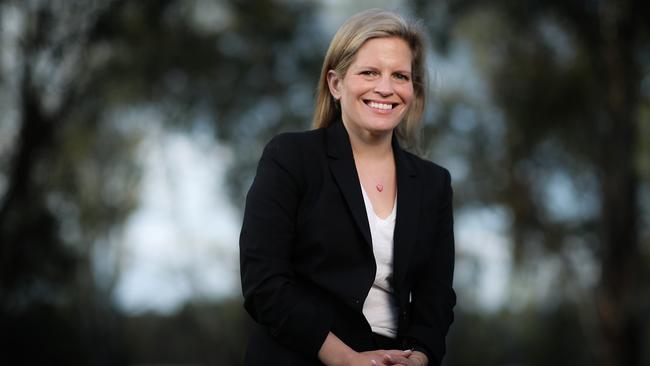Your 11 year old has probably seen porn: what every parent needs to know and ask their kid
By the age of 11, most children have seen porn. A new book by Daisy Turnbull offers advice on the conversations parents need to be having with their children before they reach that age.

VWeekend
Don't miss out on the headlines from VWeekend. Followed categories will be added to My News.
What is your relationship with porn?
Let’s look at some stats on porn. Porn is everywhere online and your teenager has very likely seen it, as most kids have by the age of 11. That is not your fault. Porn is a bit like swear words; all it takes is for one kid at school to have an older sibling and then the whole playground is effectively “levelled up”.
Porn is easily accessible, and it is not going anywhere. It is changing sexual appetites. A kid who starts watching pretty normal porn will get desensitised, or tolerant, to it and then will seek out more porn, or new genres of porn, which almost always means more violent and dominating porn.
Porn interests escalate. If your teenager starts watching some risqué series or French movies on SBS when they are 13, then by the time they’re 16 or 17 they’ll be watching pretty hardcore porn.

As I explained to some friends once, it’s a bit like Game of Thrones. That first season we were all “ahh blood, murder, thrown off a wall, raped, this is too much”, but then by the final season we’re all “yeah a whole city was just burnt by a dragon and someone was raped, not much happened”.
Porn can affect people in two different ways: either by watching it, or by interacting with others who do.
Therefore, talking to your teen about porn requires two conversations:
The gazer
If your teen is watching porn as the gazer, then you need to tell them that porn is not real. It is not how sex between most people is, and it is certainly not the kind of sex teenage girls expect, or want to be having. Don’t get judgmental about the fact they’re watching porn, but ensure the reality of the situation is clear.
The biggest issue with teenage boys watching porn seems to be that they consider porn sex to be sexy and everything else to be boring.
But even more, in an Atlantic article in 2018 on the teenage sex recession, we learned that teen boys are having less sex and some aren’t even bothering with dating because it’s too hard – all that effort, and then the sex doesn’t live up to their expectations.
Teenage boys are having issues with erectile dysfunction from the dissociative experience of watching porn, which also perpetuates the myth that “men are rock hard and women are ready for sex all the time”, says Clare Faulkner, a British psychosexual and relationship counsellor.
So, maybe you walk in on your son watching porn and have a pre-emptive chat, or maybe they’re already facing these issues.

Either way, it’s important to ensure they understand that porn isn’t real, and that it creates unrealistic expectations.
It used to be that you’d start feeling sexual in your mid-teens and then have sex and then maybe start watching porn.
Now porn is the start of it, and teens are watching it before they are sexually aware, which means it is guiding sexual appetites.
Porn is how a lot of teens are introduced to sex. It is forming their sexual identity. But furthermore, as US psychologist Dr Lisa Damour discusses in her podcast, Ask Lisa, your teen creates a link between watching porn – which they know is wrong, so they feel shame – and having a physical response to it.
This starts to build a cognitive link between sex, pleasure and shame.
The gazed upon
Unless your partner tells you that they watch a lot of porn, you only know your partner watches a lot of porn when it infiltrates your sex life.
There is no laughter or playfulness, oral sex becomes about power instead of enjoyment, and there is a lot of stuff happening from behind. There is also an expectation that women will orgasm in an instant.
It can be hard to realise that this is not about you, but it isn’t. If your teenager is the gazed upon, the conversation you need to have is about the importance of open communication and boundaries around sex.
They need to tell their partner that they want sex to be different from how it is, and to be about both their enjoyment.
This might lead to the relationship ending, to a lot more conversations, and potentially even some shame, but these outcomes are all better than having bad sex for the rest of your life.
This is also specifically difficult for females who may know nothing about sex, meaning they can’t suggest anything else.

This pairing of bad knowledge against almost no knowledge leaves little space for talking about what each other wants.
So, if you are comfortable talking to your teenager about sex and pleasure, talk about it with them honestly. If you are not, due to any number of reasons, from awkwardness to religious and cultural beliefs, be honest with them about that.
Explain that you don’t want to have the conversation, but that you understand and support them if they want to discuss it with another trusted adult or friend.
There is nothing wrong with watching some porn, but it can’t be the standard all sex is set to. There is also porn for women that focuses on female pleasure. Talk about porn, because it is definitely having an influence.
Note: I structured and wrote this section in a very heteronormative way, because that is what I’ve mainly experienced in my teaching and research. But the gender of the gazer and the gazed upon can be interchangeable.
What do you know about consent?
The topic of consent is one that really should be pretty simple, and yet over and over again we read stories of rape, sexual assault and harassment.
Consent is actually something that can be discussed from a surprisingly early age. I considered including it in 50 Risks to Take with Your Kids, but I think age 10 is really when you want to start having the conversation.
You probably don’t want to have “the talk” about sex when your kid is “too young”, but remember, the majority of 11 year olds have seen porn. Sex is out there. Talk to your teen about sex before someone else shows them a very different idea of what it is.

I remember very distinctly having two talks. The first was about how stuff works. Periods, ovulation, sperm, pregnancy. I think I was about 11. The second talk was a few years later. It probably coincided with a boy’s name being mentioned a few times and Mum and Dad thinking they should update the talk in the context of me actually having sex. I remember Mum kept saying I had to feel comfortable. More on that later.
I don’t think we had the third talk – the “consent” talk. Maybe we did.
But I think because Mum really reminded me over and over about being comfortable, the concept of not being comfortable, and that not being okay, was clearly implied. It was there, it just had a different language.
Today you need to do all three talks in one, and the consent part of the conversation needs to come up again and again, and again.
THE TALK
● You need to explain how stuff works. You need to cover the actual birds and the bees. This can include contraception, depending on your family’s views.
● If your family believes sex is only for after and within marriage, then explain why.
● Don’t make sex scary or shameful. In every religion and culture, it is okay to enjoy it. There is nothing wrong about sex.
● Explain that while sex is meant to be enjoyed, it can take a while to get to that point, and that’s okay.

● Introduce the idea of consent. Explain that when it comes to sex, your teen should only ever do what they want, what they feel comfortable with. Nobody who loves or cares about them would coerce, bully, guilt trip or force them into doing anything they don’t feel comfortable with. Tell your teen to tell their partner that anything but an enthusiastic yes is a no.
● Also explain that while there is never any excuse for consent not being sought and respected, your teen can protect themself by avoiding getting stupidly drunk and by always being with friends who they trust and who won’t leave them on their own. (But that’s a conversation about alcohol in general.)
● Explain that what your teen sees with porn is not what sex is like, and to be careful watching it. Tell them that if they are not absolutely certain their partner wants to have sex, if there is not an enthusiastic yes in the moment, then it is a no. Explain that they cannot get resentful if their partner doesn’t want to have sex – there will be other times (and that this is more likely if they treat people with respect!).
● Also tell your teen that while it may be the “done thing” to boast about sex, it is far better to be discreet than to brag.
● Tell your teen that drunk people are never consenting. Passed-out people are never consenting. Tell them to tell their friends, too.
● Tell them to always use protection. Even if you do not support premarital sex, but you think your teen is having sex, ensure they are being safe.
● The rules around consent are exactly the same for people in relationships as for those engaging in “hook-ups”.

Who are you online?
Parents are often flabbergasted at what their kid might post online, but often their teen may not know why they’ve done it.
From someone who has worked hard not to embarrass her family, from her teens through to her 30s, here are my tips for teens for keeping themselves nice online.
1. Call your grandma and check if what you’re about to post shocks her.
2. Imagine seeing what you’ve written on the cover of the newspaper.
3. Test it out on friends (one friend of mine always calms my tweets down, the other always makes them more incensed).
4. Keep your group chats clean or incredibly trusting. There should be a clear relationship between how much you trust the people in your group chat and how honest and inappropriate you are willing to be.
5. Agree to a semi-regular wipe of group chat content because, let’s face it, sometimes jokes age poorly.
There is not much today that teens do not share online. They are tapped into social media, which would be fine if they were just sharing pasta recipes and crochet patterns, but what they see is more extreme, and it’s becoming normalised. These days, normal for teens includes hypersexualised images, violence, derogatory language and disrespect.
The privacy conversation can happen early. It should absolutely happen before your kids go on social.

Aristotle once referred to the play Oedipus Rex as having unity of place because it existed in a liminal space – literally the threshold between public and private. This is a good way to describe the grey area between private and public to teens.
There is the private sphere of family, and the public out there, but it’s important to recognise that there is a space between the two, where people can see in. How much of their lives do they want to be in that space?
Also talk about family privacy when your teen starts posting. You may not want identifiable images of your home, or the fact that you are away from home, being shared online (an invite for burglars).
You can start seeking their consent to post images of your teen online, and expect the same of images they post of you. Promote the use of close friend circles on social media apps, as well as private accounts.
In romantic relationships I think the implications of being online go even further. Talking to your teen about sending nudes is going to be uncomfortable for both of you, but it is still a conversation you need to have.
Don’t send nudes to someone who is harassing or pressuring you to do so. If they call you a prude, fine. It is far better to be a prude than to share something and regret it.
Again, go back to whether or not you want it on the cover of the newspaper – or coming up in a job interview.
Now might also be a good time to just remind them that anything they put online will be there forever and could affect future career options (especially in politics).
More Coverage
Originally published as Your 11 year old has probably seen porn: what every parent needs to know and ask their kid




